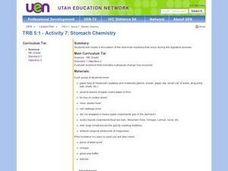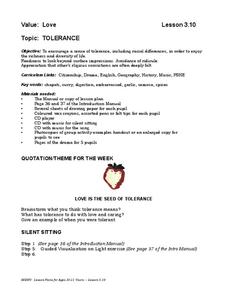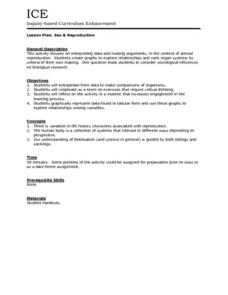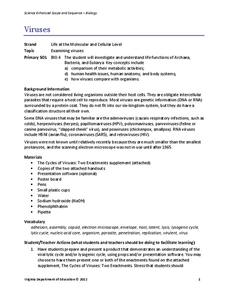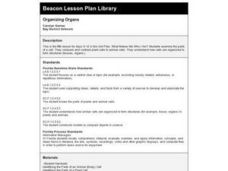Curated OER
Feed Me, Seymour
Learners work in small groups to create posters illustrating the major facts and functions of plant organs. Within their groups, they assume the role of specialists creating specialized posters pertaining to the different parts of plants.
Curated OER
Stomach Chemistry
Fifth graders compare physical and chemical changes. They perform a simulation experiment/activity that replicates what happens in the stomach as food is digested by stomach acids.
Curated OER
All in the Family: Calculating Cousins
Students view pictures of distant "cousins" to humans. They place them in order by their distance from humans. Students receive a packet of six pages featuring graphics and a cousins summary page. They work in groups to complete 5 cousin...
Curated OER
Dietary Fiber Introduction
Students research fiber and consider its sources, functions and importance to overall health. They sample high-fiber items, complete worksheets and take a quiz on their fiber research.
Curated OER
Tolerance
Students are encouraged to have a sense of tolerance, including racial differnces, in order to enjoy the richness and diversity of life. They are shown readiness to look beyond surface impressions. Students appreciate that other's...
Curated OER
Coordination
Multiple choice, fill-in-the-blank, short answer, and matching questions are all here in a multi-page worksheet or quiz. While the formatting leaves a little to be desired, it would take just a few minutes to change the handout into a...
Curated OER
Structure and Function of the Cell/Introduction to the Cell
So, this is not technically a worksheet, but rather a chapter of reading material, pictures, and diagrams introducing young biologists to the cell. Cell theory, diversity, size, and shape are described. The internal organization and...
Curated OER
Sex & Reproduction
Students examine animal reproduction by interpreting data and making arguments and then create their own graphs to explore relationships of organ systems. This lesson includes an individual worksheet and a reflective review question for...
Curated OER
Levers and Pulleys
Seventeen pages of material leave you well-prepared to carry out this lesson on levers and pulleys. Photos and diagrams make the instructions clear; resource links provide additional information. The missing aspects of this teacher's...
Curated OER
Pacific Salmon and Mountain Pine Beetle
Students compare fish anatomy. In this teacher demonstrated dissection lesson, students compare fish anatomy to that of humans. They explore different fish and their unique properties. There are 4 distinct activities which can be...
Curated OER
Human Heart Anatomy
Students identify the 4-chambers and major blood vessels of the heart and
construct a model of a 4-chamber heart. They sketch their model, identify the chambers/vessels, state the condition of the blood in each chamber/vessel, and...
Curated OER
Termite Biology
Students explore the physical characteristics, distribution and habitat of termites. The lesson focuses on the termite as a social creature contrary to most other insects.
Curated OER
FOOTSTEPS IN TIME
Students measure and correlate their foot lengths and body heights, then use this data to estimate height of Laetoli hominids. They use metric measurement and graphing to determine these heights.
Curated OER
Live Well Now to Live Longer Later
Ninth graders select a topic to research, completing the sentence, "Are the effects of _______ really that detrimental to one's health?" They record information in a journal, including sources of information. Students work in groups with...
Virginia Department of Education
Viruses
Germs, parasites, and viruses, oh my! Facilitate a lesson on viruses as individuals explore functions of Archaea, Bacteria, and Eukarya. They learn how viruses compare with other organisms in nature and how they contribute to health...
Curated OER
Comparing Three Religions: Islam, Judaism, and Christianity
Pupils work together in groups to research either Judaism, Christianity, or Islam. Once the research is complete, they share their information with the other groups in the class. They complete a worksheet on rituals and holidays in...
Curated OER
Our Lifeline Pump
Fourth graders, in groups, the exterior and interior of the human heart.
Curated OER
Mechanisms to Fight Disease
Students explain how our body fight diseases. In this biology activity, students identify the role of bacteria and viruses in human illness. They create a PowerPoint presentation and essay at the of the unit.
Curated OER
Cells and Cancer
Students idenitfy that cancer is a growth of mutated cells and that cancer cells are only one type of cell that causes disease in our body. They also identify that all eukaryotic cells contain a nucleus, cytoskeleton, and a cell...
Curated OER
Dental Health
Fourth graders investigate the types of habits that are necessary for good dental health. They use information provided from a variety of resources to make conclusions of the overall practice of dental hygiene. Then students produce a...
Curated OER
Organizing Organs
Fifth graders research plant and animals cells and create a Venn Diagram to show the similarities and differences.
Curated OER
Lakes and Ponds
Students describe and recognize the difference between a lake and a pond. They name six ways in which a lake or pond can be formed. They describe the importance and act of evaporation on a waterway.
Curated OER
You Won't Believe Your Eyes!
Students gain a basic understanding of the sense of sight. They watch a video on sight, then engage in some vocabulary games, and perform some simple experiments which focus on the basics of sight.
Curated OER
Water Is Cool!
Students study water as a non-renewable resource. For this water lesson, students examine sources of water, uses of water, and explain why it is important to take care of water sources for the common good. They research the water cycle...



